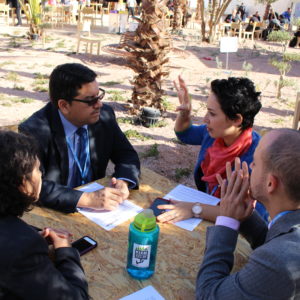I’ve talked with many of you about what it takes to succeed in creating the kind of social change that you and I are committed to. In this moment — after a series of catastrophic climate events, with the ravages of white supremacy and patriarchy laid bare, and as we enter the second year of the Trump presidency — it’s vitally important to dig deep into this question with you.
I’ll share a story that some of you may know: In 1988, Corporate Accountability (then called Infact) was opening a regional organizing center to expand the General Electric boycott in the Pacific Northwest. I’d followed Infact’s help wanted ads on the back page of the Seattle Weekly longingly for months. The threat of nuclear war was terrifying to me, and I wanted to be part of this gutsy, grassroots organization that was going toe to toe with the military-industrial complex. But I would see those ads and think, “They’d never hire me. I’m not qualified to take this on.”
Like so many of us, I was deterred by our society’s myths about how social change happens — myths that are fundamentally disempowering.
But in a fateful coincidence, Infact got my name from Seattle University because of my campus activism, and they called me. And when I got the job, I quickly learned two important truths. First, Corporate Accountability is never held back by what seems impossible. And second, the secret to creating effective change is really no secret at all. It’s about building strong relationships with people and helping them recognize, embody, and exercise their power within a strategy that leverages collective power.
Disempowering myths about social change are everywhere. We must counter them by demonstrating the empowering truth of how social change really happens.
The hero and the spontaneous uprising
From Greek epics to mystery novels, the story of the solitary hero who saves the community has been with us for a long time. We want to believe that a few gifted individuals will come along with ingenious fixes and “crack the nut” on social change. We often see this story play out in today’s funding trends, the popularity of TED Talks, and the disproportionate attention the media pays to “entrepreneurs” and “angels.”
Another all-too-common story focuses on the spontaneous uprising. According to this story, when things get bad enough, people will just rise up and change things — no strategizing or organizing required! Popular representations of social change emphasize the spontaneous resistance of the people, while glossing over the planning, preparation, fundraising, and education that fueled them.
As change-makers, we can’t afford to play into these myths. Yes, brilliant and charismatic people are important in inspiring people, and yes, action is vital. What both of these myths leave out is the critical — and certainly less glamorous — component of organizing.
When we organize, we bring together many people with a range of perspectives. We uncover and name our common values; we carefully craft plans grounded in proven strategies and creative, fresh tactics; and we channel our individual resources and connections into strategic, collective action. The result is a leveraging of power that creates change larger and more systemic than any of us can achieve on our own or through spontaneous action.
Achieving the impossible, together
During my three decades at Corporate Accountability, I’ve had over 10,000 organizing conversations with partners like you. And together, we have achieved what seemed impossible. We moved GE out of the nuclear weapons industry. We secured precedent-setting corporate accountability measures in the global tobacco treaty and helped make it one of the most widely and quickly embraced U.N. treaties in history. We compelled the World Bank to divest from one of the largest water privatizing corporations, helping to protect the human right to water around the world.
We moved governments representing nearly 70 percent of humanity to stand up to the powerful fossil fuel industry at the U.N. climate treaty meetings.
We’ve done so much more than any of us could do alone — and it happened because thousands of people like you said yes, count on me, count me in.
And now that the Trump presidency has revealed the full extent of corporate power in our society, we’re asking you to step even deeper into your values, your power, your connections, and your relationships. The power for social change that you bring is more essential than ever.
I am inspired and grateful for how you have said yes time and time again. Thank you. You’ve risen to the challenge of this moment in history and you’ll keep rising. Not because you’re a superhero, but because, as the poet June Jordan wrote, “We are the ones we have been waiting for.”
Now, let’s build for justice even more boldly, together.







